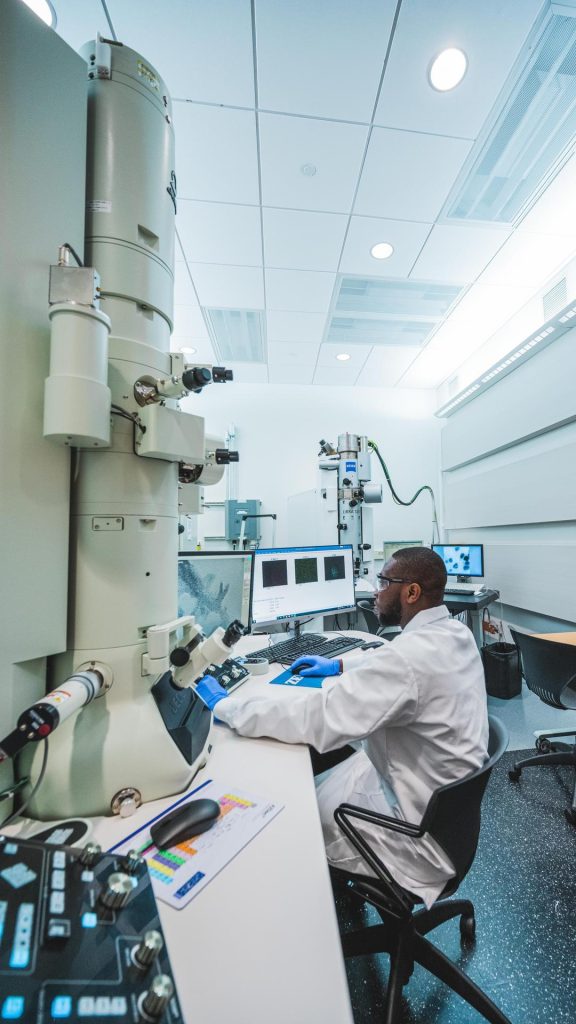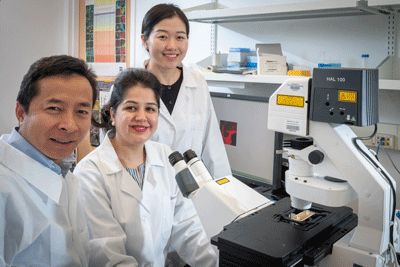About JSNN
The Joint School of Nanoscience and Nanoengineering (JSNN) is an academic collaboration between North Carolina Agricultural and Technical State University (NC A&T) and The University of North Carolina Greensboro (UNC Greensboro). Both of these institutions are accredited by the Southern Association of Colleges and Schools Commission on Colleges (SACSCOC). Located on the South Campus of Gateway University Research Park, JSNN builds on the strengths of our universities to offer innovative, cross-disciplinary graduate programs in the emerging areas of nanoscience and nanoengineering.
What we offer
JSNN offers four degree programs in four research focus areas: a Master of Science (M.S.) in Nanoscience, a Ph.D. in Nanoscience, an M.S. in Nanoengineering, and a Ph.D. in Nanoengineering. We also offer nine Graduate Certificates Programs.
Synthetic Biology
The synthesis of complex, biologically-based or biologically-inspired systems which display functions that do not exist in nature or the re-design of existing natural biological systems for useful purposes and biotechnologies. It is an interdisciplinary field that combines principles of molecular biology, biochemistry, and nanoscience.
Computational Nanotechnology
The modeling and simulation of devices, structures, and systems, including composite materials, computational biology, and materials modeling.
Nanomaterials: Molecular Structures and Devices
The synthesis, processing, manufacturing, and characterization of nanostructured materials that can be applicable in emerging technologies, medical diagnostics, composite materials, signaling, and optoelectronics.
Environmental Science and Sustainability
The environmental impact of nano materials and the knowledge gaps associated with energy harvesting, scavenging, and storage.
These technical areas afford numerous opportunities for collaboration with industrial partners.
JSNN is a $56.3 million, 105,000 square foot state-of-the-art science and engineering research facility, with nanoelectronics and nanobio clean rooms, nanoengineering and nanoscience laboratories, and extensive materials analysis facilities. JSNN’s characterization capability includes a suite of microscopes from Carl Zeiss SMT®. Our visualization center allows three-dimensional imaging for modeling of nanotechnology problems. JSNN collaborates with Guilford Technical Community College and Forsyth Technical Community College on an internship program that exposes students to the advanced technology at its facility. JSNN is also actively engaged with K-12 outreach with Guilford County Schools.
Our Mission
The Joint School of Nanoscience and Nanoengineering (JSNN) is a collaboration between two high research universities: North Carolina A&T State University (NC A&T SU) and The University of North Carolina at Greensboro (UNC Greensboro). JSSN’s mission is to be a catalyst for breakthrough innovations that provide high-impact academic, industry, and government research outcomes. The research and collaborations formed are leading to breakthroughs in materials, products and processes that stimulate the economy and improve the world around us.
JSNN is also a catalyst for economic development. The Southeastern Nanotechnology Infrastructure Corridor (SENIC) was created as a partnership between Georgia Tech and JSNN. SENIC combines the infrastructure strengths of both Georgia Tech and the JSNN to provide academic, industry and government users with affordable access to one of the largest and most modern Nanofabrication and Nanocharacterization tool sets in the country.
To achieve our mission, JSNN recruits the best and brightest students from a variety of disciplines to conduct advanced research in Nanoengineering and Nanoscience. Students are challenged to choose a research area that is expected to provide significant benefit to mankind. Beyond becoming exceptional researchers, students will develop leadership and communication skills that will make them an exceptional asset in any academic, industry or government organization.
our Vision
Collaboration will always be a core part of JSNN’s DNA. JSNN will constantly seek out strategic collaborations with other academic institutions, industry and government organizations as a catalyst for continuing to produce research breakthroughs.
JSNN actively recruits organizations from academia, industry and government to join. For a nominal annual membership fee that is applied to tool and facility rental, JSNN provides NIC members with training and 24/7 access to JSNN’s facilities, state-of-the-art tools and labs. This is resulting in economic development and job creation for the Greensboro region.


Visit Us
JSNN is located on the south campus of Gateway Research Park, another collaboration between NC A&T and UNCG. Our location at Gateway Research Park provides the opportunity for our members to locate or co-locate facilities adjacent to JSNN’s facilities for 24/7 access to tools and labs.
Scheduling a Tour
Are you interested in viewing the facility or bringing a class of students to visit? Join us for a tour of the JSNN campus. Contact us at jsnninfo@ncat.uncg.edu to discuss details. We’re excited to introduce you to our state-of-the-art research facility.
Parking
Ample parking is available at JSNN, at no cost.
Contact Us
Location
JSNN is located on the South Campus of Gateway University Research Park
Admission
Nanoscience Dr. Jianjun Wei
Graduate Program Director
Phone: 336.285.2859
Email: i_wei@uncg.edu
Nanoengineering Dr. Michael Curry
Graduate Program Coordinator
Phone: 336.285.2707
Email: mlcurry@ncat.edu
Mailing Address
The Joint School of Nanoscience & Nanoengineering
2907 East Gate City Boulevard
Greensboro NC 27401
For general inquiries, call +1.336.285.2800 or email jsnninfo@ncat.uncg.edu
Support Us
Your donation supports
our researchers and our students.

Supporting JSNN changes lives for generations to come. Your donations provide scholarships, tuition relief, and helps us attract and retain the very best faculty, staff, and resources. Your support plays a direct role in helping us create breakthrough innovations that provide high-impact academic, industry, and government research outcomes.
Use the buttons to make a secure donation through UNC Greensboro or through NC A&T State University.
Major Gifts: Annual Giving,
Endowments, Matching Gifts, and Planned Gifts
If you’re considering making a significant donation or bequest, please call or email mhchowdhury@uncg.edu to discuss with Dr. Chowdhury, the Dean of the Joint School of Nanoscience and Nanoengineering.
Annual Giving
Your annual gift supports the greatest needs of JSNN, individual departments, and programs. There is no gift too large or too small!
Matching Gifts
Many employers sponsor matching gift programs and will match any charitable contributions made by their employees, increasing the reach and impact of your gift to JSNN. To find out if your company has a matching gift policy, please search for your employer’s name through the Office of University Advancement’s webpage.
Endowments
Gifts of $15,000 or more can transform the lives of our students and faculty by providing access to scholarships, financial support, research, experiential education, leadership opportunities, and more. Because endowments are forever, the giver can give them an honorary name. These gifts may be pledged and fulfilled over a period of years. Endowments may be established while you are living, or as part of your estate.
Your endowment gift becomes part of the larger UNCG endowment, allowing the principal to earn interest to support scholarships, program funds, professorships, and more.
Planned Gifts
Leave a legacy at JSNN and change lives for generations to come. Financial or estate gifts allow you to make lasting impact now or beyond your lifetime, while bringing financial benefits for yourself and your family today.
 Donate through NC A&T
Donate through NC A&T